
BRAIN AND LANGUAGE
Scope & Guideline
Fostering Scholarly Dialogue in Brain and Language Studies
Introduction
Aims and Scopes
- Neuroscience of Language Processing:
Investigates the neural mechanisms involved in language comprehension, production, and acquisition, often utilizing techniques like fMRI and EEG to understand how different brain regions interact during language tasks. - Language Disorders and Rehabilitation:
Focuses on understanding and treating language disorders such as aphasia and developmental language disorder (DLD), exploring both the underlying neural correlates and effective therapeutic interventions. - Bilingualism and Multilingualism:
Examines how bilingual and multilingual experiences shape cognitive processes, neural connectivity, and language proficiency, emphasizing the implications for education and cognitive health. - Developmental Language Studies:
Explores language acquisition and processing in children, assessing how various factors such as age, socio-economic status, and exposure to language influence developmental trajectories. - Cross-linguistic and Cultural Perspectives:
Investigates how linguistic and cultural differences impact cognitive processes, with studies often comparing native and non-native language processing and the effects of language structure on thought. - Emotional and Social Aspects of Language:
Studies the interplay between language and emotional processing, including how language influences social cognition and vice versa, often through experimental and neuroimaging methodologies.
Trending and Emerging
- Neuroplasticity and Language Recovery:
A significant increase in studies examining neuroplasticity in the context of language recovery, particularly post-stroke rehabilitation, indicates a growing interest in understanding how the brain adapts after injury. - Language Processing in Diverse Populations:
Emerging research is increasingly focused on language processing across diverse populations, including children with developmental disorders and bilingual individuals, highlighting the need for inclusive approaches in language studies. - Integration of Technology in Language Learning:
The intersection of technology and language learning, including the use of machine learning and digital tools to enhance language acquisition, is gaining traction, reflecting contemporary educational trends. - Emotional and Social Cognition in Language Use:
Research exploring the connections between emotional processing and language use is on the rise, emphasizing the importance of understanding language in social contexts and its implications for mental health. - Real-time Language Processing and Communication:
An increasing focus on real-time language processing reflects a trend towards understanding how language is dynamically produced and comprehended in social interactions, utilizing advanced neuroimaging techniques.
Declining or Waning
- Traditional Linguistic Structures:
Research focusing solely on classical linguistic theories and structures has decreased, as the journal increasingly emphasizes empirical studies and neurobiological perspectives over theoretical linguistics. - General Cognitive Psychology:
Themes related to broad cognitive psychology that do not specifically tie back to language processing are appearing less frequently, indicating a shift towards more targeted studies that directly link cognitive processes to language. - Static Models of Language Processing:
The prevalence of studies using static models of language processing has diminished, replaced by a growing interest in dynamic, interactive models that account for real-time language use and neuroplasticity. - Aging and Language without Context:
While aging and its effects on language remain relevant, there is a noticeable decline in studies that do not contextualize aging within broader cognitive or neural frameworks, reflecting a more integrative approach to understanding language across the lifespan.
Similar Journals

Lingue e Linguaggio
Connecting Scholars in the Realm of Language and LinguisticsLingue e Linguaggio, published by SOC ED IL MULINO, is a distinguished academic journal in the field of Linguistics and Language, hailing from Bologna, Italy. With an esteemed Q2 ranking in its category as of 2023, this journal is recognized for its contributions to both the arts and humanities as well as social sciences, achieving notable positions within Scopus rankings. It serves as a vital platform for researchers, practitioners, and students interested in exploring various linguistic phenomena, language dynamics, and theoretical frameworks. Although it operates under a traditional subscription model rather than open access, its comprehensive array of studies and publications provides significant insights and fosters academic discourse. With a publication period extending from 2002 to 2024, Lingue e Linguaggio continues to be a key resource for advancing the understanding of language in contemporary contexts.
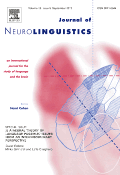
JOURNAL OF NEUROLINGUISTICS
Unraveling the Neural Threads of LinguisticsJOURNAL OF NEUROLINGUISTICS, published by Pergamon-Elsevier Science Ltd, is a premier academic journal that rigorously explores the intersection of language and the brain, emphasizing the cognitive and neurological underpinnings of linguistic processes. With an ISSN of 0911-6044 and an E-ISSN of 1873-8052, this journal has established itself as a crucial resource for researchers, professionals, and students in the fields of linguistics, cognitive neuroscience, and psychology. Boasting an impressive Q1 classification in Linguistics and Language and Arts and Humanities (miscellaneous) for 2023, the journal demonstrates significant impact, having achieved a ranking within the 91st percentile in Linguistics and Language according to Scopus rankings. The scope of the journal spans comprehensive studies from 1985 to 2025, reflecting a long-standing commitment to advancing the understanding of how language interacts with human cognition. Although it does not currently offer open access, its relevance extends well beyond its articles, contributing to ongoing scholarly dialogues and fostering new insights in the study of neurolinguistics.
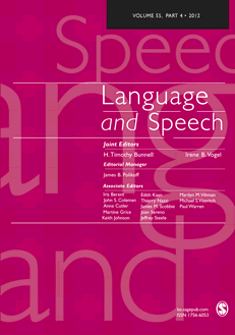
LANGUAGE AND SPEECH
Exploring the Dynamics of Language and SocietyLANGUAGE AND SPEECH, published by SAGE PUBLICATIONS LTD, is a premier journal that serves the multifaceted realms of linguistics, speech science, and sociology. With a robust history of scholarly contribution since 1958 and an anticipated continuation through to 2024, the journal is recognized for its high-impact research, boasting a commendable impact factor and achieving Q1 ranking in both Linguistics and Sociology as well as Q2 in Medicine and Speech and Hearing categories as of 2023. The journal, available in both print and online formats with ISSN 0023-8309 and E-ISSN 1756-6053, provides a vital platform for interdisciplinary discourse among researchers, professionals, and students alike. Its rigorous review process and quality publications place it at the forefront of academic inquiry, offering critical insights that advance the understanding of language and its implications in various contexts. As a key resource in the field, LANGUAGE AND SPEECH continues to foster innovation and knowledge dissemination, making it an essential addition to the libraries of those committed to exploring the depths of communication sciences.
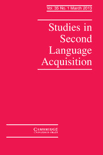
STUDIES IN SECOND LANGUAGE ACQUISITION
Unlocking the complexities of second language acquisition.STUDIES IN SECOND LANGUAGE ACQUISITION, published by Cambridge University Press, is a premier journal dedicated to advancing the field of second language acquisition. With an ISSN of 0272-2631 and an E-ISSN of 1470-1545, this journal has carved its niche as a leading resource for scholars and practitioners alike since 1978. Recognized in Q1 quartiles across both Education and Linguistics and Language, and ranked within the top 2% in its fields according to Scopus, it provides a platform for cutting-edge research that addresses the complexities of language learning and teaching. Although it does not currently offer open access, the journal remains widely accessible through institutional subscriptions, ensuring that groundbreaking research reaches a global audience. With a focus on empirical studies, theoretical discussions, and innovative methodologies, STUDIES IN SECOND LANGUAGE ACQUISITION is essential for those seeking to deepen their understanding of language education, making it a must-read for researchers, educators, and students committed to the evolving landscape of language acquisition.
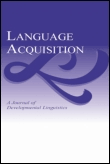
Language Acquisition
Fostering interdisciplinary insights into language development.Language Acquisition, published by ROUTLEDGE JOURNALS, TAYLOR & FRANCIS LTD, is a leading academic journal dedicated to the interdisciplinary study of language development and acquisition. With an ISSN of 1048-9223 and E-ISSN 1532-7817, this peer-reviewed journal caters to professionals, researchers, and graduate students in the fields of linguistics and educational psychology. The journal boasts an impressive 2023 Scopus ranking of Q1 in Linguistics and Language and Q2 in Education, reflecting its high impact and relevance within academic circles. Notably, it is indexed among the top 15% of journals in Language and Linguistics, showcasing its significance in contributing knowledge to these vibrant fields. Although currently not open access, Language Acquisition makes a profound impact on understanding how individuals acquire language, facilitating discussions on pedagogical strategies, cognitive development, and sociolinguistic factors. The journal's historical and ongoing contributions since its inception in 1990 reinforce its position as a vital resource for advancing research and theory related to language acquisition.

Neurobiology of Language
Advancing understanding at the crossroads of linguistics and neuroscience.Neurobiology of Language, published by MIT Press, is a premier scholarly journal dedicated to pioneering research at the intersection of linguistics and neuroscience. As part of the prestigious Q1 quartile in both Linguistics and Neurology, this journal not only ranks in the top tier of its fields—placing 41st out of 1167 in Linguistics and 57th out of 192 in Neurology according to Scopus—but also serves as a vital platform for innovative studies that explore the complexities of language from a neurobiological perspective. Though offered under a traditional subscription model, the journal ensures accessibility to groundbreaking research that is crucial for advancing our understanding of how language is processed and represented in the brain. With a focus on works produced between 2020 and 2024, the Neurobiology of Language is committed to disseminating influential and transformative research that shapes the future of cognitive science, language development, and neuropsychology, making it an essential resource for researchers, professionals, and students alike.

Linguistic Research
Unveiling the Nuances of Language Through Rigorous ResearchLinguistic Research, published by the Kyung Hee University Institute for Study of Language & Information, stands as a prominent platform within the field of linguistics and language studies. With an ISSN of 1229-1374, this journal has gained recognition for its contributions to theoretical and empirical research since its inception in 2014. Ranked in the Q2 category of linguistics and language in 2023, it has established its presence in prestigious databases like Scopus, where it ranks #404 in Arts and Humanities and #479 in Social Sciences. The journal actively encourages scholarly discussion and innovation, providing a crucial venue for researchers, professionals, and students to disseminate their findings and engage in the evolving conversation around language. Despite not being open access, Linguistic Research is pivotal for those seeking comprehensive insights and advancements in linguistic studies, making it an essential resource for anyone passionate about the dynamics of language and communication.
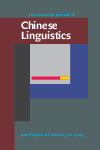
International Journal of Chinese Linguistics
Pioneering Studies in Chinese LinguisticsInternational Journal of Chinese Linguistics is a distinguished publication that delves into various aspects of linguistic studies pertaining to the Chinese language. Published by John Benjamins Publishing Co, this journal stands out for its commitment to advancing the knowledge and understanding of Chinese linguistics within the global academic community. With an impact factor that places it in the Q2 quartile of linguistics and language, the journal is indexed in prominent databases, achieving ranks of #501 in Arts and Humanities and #580 in Social Sciences. These rankings reflect the journal's dedication to maintaining high scholarly standards and its relevance in both linguistic research and practical applications. While not categorized as Open Access, the journal provides necessary access through institutional subscriptions, thereby ensuring that valuable research reaches a broad audience. Covering a wide range of topics from syntax and phonetics to sociolinguistics and applied linguistics, the International Journal of Chinese Linguistics serves as an essential resource for researchers, professionals, and students seeking to deepen their understanding of the intricate relationship between language and culture in the Chinese context. With converging years from 2019 to 2024, it continues to evolve, reflecting ongoing developments in the field.
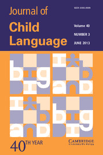
JOURNAL OF CHILD LANGUAGE
Pioneering Research in Developmental Language StudiesJOURNAL OF CHILD LANGUAGE, published by Cambridge University Press, is a premier scholarly journal dedicated to the exploration and examination of language development in children. Since its inception in 1974, the journal has become an authoritative source in the fields of Developmental and Educational Psychology, Experimental and Cognitive Psychology, and Linguistics, boasting significant impact as evidenced by its ranking in the top quartiles across these domains. With an impressive impact factor and a commitment to advancing research, the journal serves as a vital platform for researchers, educators, and practitioners interested in the intricacies of language acquisition and cognitive development in children. The 2023 Category Quartiles place it in Q1 for Linguistics and Language, further establishing its excellence. Fostering a rich intellectual community, the journal invites contributions that advance our understanding of child language, promising a broad readership in both the social sciences and humanities.

JOURNAL OF MEMORY AND LANGUAGE
Unlocking the Secrets of Cognitive ConnectionJOURNAL OF MEMORY AND LANGUAGE, published by Academic Press Inc Elsevier Science, is a prestigious journal dedicated to advancing the understanding of cognitive processes related to language and memory. With an impact factor that underscores its authority and relevance, the journal has achieved remarkable recognition, ranking in the Q1 quartile across multiple disciplines such as Artificial Intelligence, Experimental and Cognitive Psychology, Linguistics and Language, and Neuropsychology and Physiological Psychology, as of 2023. With its origins tracing back to 1985, the journal continually provides a platform for high-quality research and innovative studies that intersect diverse fields including cognitive science and linguistics. Although it does not offer open access, the Journal of Memory and Language serves as an essential resource for researchers and professionals seeking to explore the intricate interplay between memory and language. Make sure to access state-of-the-art research that not only informs theoretical frameworks but also has practical implications in real-world situations.